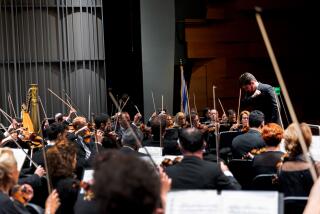Music Review : Fast Tempos Amplify Collegium’s Shortcomings
- Share via
COSTA MESA — Could the Brandenburg Collegium, a period-instrument ensemble directed by harpsichordist Anthony Newman, learn something about tempo from the great German conductor Otto Klemperer?
It is said that there was no such thing as a Klemperer tempo (though they often seemed to be slow), but that he chose a tempo to fit the circumstances--his players, the hall--and to allow the music to be articulated cleanly and breathe.
In performing the six “Brandenburg” Concertos by Bach, Monday night at the Orange County Performing Arts Center, Newman and his Collegium too often sounded as if they had a tempo to prove, not to make work. Their rapid allegros rendered musical lines murky, and the pulse often failed to jell.
There were other problems, too. The New York-based ensemble, 13-strong at its biggest Monday, listed several players from our own local music ensembles, or, as the official spin coming back through a spokesperson had it, “area specialists invited to join the group.” In other words, this was part Collegium, part pickup band, and, frankly, it sounded like it. Too bad for the uninformed public.
*
All evening, things sounded not quite. Though performances were basically neat and not without finesse, the gleam of true virtuosity made rare appearances. These run-throughs became mundane.
What’s more, probably in an effort to combat the size of the 3,000-seat hall, Newman decided to use amplification, discreetly handled mostly, but not always. In the Fifth “Brandenburg,” the harpsichord might have been the unauthentic tank favored by Wanda Landowska. And there was something rich about the sight of period-instrument violinists and violists, who wouldn’t be caught dead with modern (and louder) steel strings on their instruments, standing right up to a microphone and having their sound piped through the PA system.
More to Read
The biggest entertainment stories
Get our big stories about Hollywood, film, television, music, arts, culture and more right in your inbox as soon as they publish.
You may occasionally receive promotional content from the Los Angeles Times.









